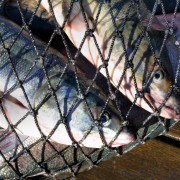New Relief Available to Fishers hit by Tariffs
If you are a Tribal Fisher impacted by regulatory tariffs, you may qualify for potentially thousands of dollars in relief funds through the Seafood Trade Relief Program (STRP).
The relief to fishers is based on seafood that has been subject to retaliatory tariffs and suffered more than $5 million in retaliatory trade damages across the United States. Eligible species are Atka mackerel, Dungeness crab, King crab, Snow crab, Southern Tanner crab, Flounder, Geoduck, Goosefish, Herring, Lobster, Pacific Cod, Pacific Ocean Perch, Pollock, Sablefish, Salmon, Sole, Squid, Tuna, and Turbot.
The relief will be calculated based on how many pounds of a specific species a fisherman caught in 2019. For example, every 1000 pounds of Dungeness Crab caught by Tribal fisher last year will fetch $470 in relief funds, says Suquamish Tribe Fisheries Administrative Program Manager Kim Kumpf.
“Some Tribal fisherman harvested nearly 20,000 lbs of crab last year, so that’ll be about $9,000 in relief funding,” says Kumpf.
Similarly, Tribal fishers will be able to claim $760 in relief for every thousand pounds of geoduck harvested last year, and $160 for every thousand pounds of salmon.
Tribal Fishers will need to complete a variety of USDA forms to claim the relief funding, says Kumpf. “This is an application for individual fishers to apply directly to the USDA. This is not through, or with, the Suquamish Tribe. This is direct from fisher to USDA,” she says.
Some quick facts about the program:
- Relief is based on harvested pounds, not income, between Jan 1, 2019 to Dec. 1, 2019.
- Application deadline: Dec 14, 2020
- What will you need?
- Fill out the complete application per directions
- Provide copy of Fishing ID
- Provide direct deposit or a canceled/voided check
- Provide poundage caught per species:
- Geoduck divers: Contact Aaron Purser (360-394-7122) at Suquamish Seafoods for your poundage totals.
- Crab, salmon, other species fishers: Contact Kim Kumpf (360-394-8438) at Fisheries for poundage totals.
- Provide Tax Exempt Form “IRC Section 7873.” You can download the form here or pick one up from Aaron Purser or Kim Kumpf.
A USDA Call Center is available for fishermen who would like one-on-one support with the STRP application process. Please call 877-508-8364 to speak directly with a USDA employee ready to offer assistance.
To download a PDF with official instructions, along with notes from Fisheries, as well as all the forms needed to apply, click here. The individual forms can also be downloaded on the USDA website here.


